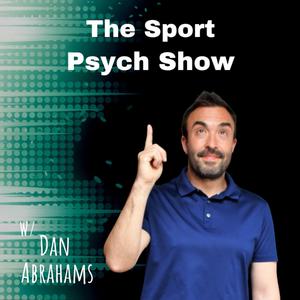
The Sport Psych Show
Dan Abrahams
- 1 hour 7 minutes#310 Dr Sam Thrower & Prof Chris Harwood - Developing Parent Education and Support Strategies in Youth Sport
I’m delighted to speak with Dr Sam Thrower and Prof Chris Harwood this week. We discuss parent education and support strategies in youth sport.
Sam is a Senior Lecturer in Sport and Exercise Psychology at Oxford Brookes University. His main research interests lie in the area of youth sport and specifically the psychosocial development of young athletes. He is particularly interested in topics such as parenting in sport, sport-confidence, motivational climates and stress and coping. Sam’s research in these areas has been published in a range of leading international journals including: ‘Psychology of Sport & Exercise’, ‘Qualitative Research in Sport, Exercise & Health’, ‘Sport, Exercise & Performance Psychology’, ‘Journal of Applied Sport Psychology’ and 'Journal of Sport & Exercise Psychology'. His current research focuses on parent-child interactions and the development, implementation, and evaluation of evidence-based sport parent education programmes.
Chris is the Director of the Sport, Health and Performance Enhancement (SHAPE) Research Centre at Nottingham Trent University (NTU). He is a Professor of Sport Psychology at NTU where his research focuses on the psychosocial aspects of athlete development, wellbeing and performance including the roles of the coach, parents, and the wider social and organisational environment. Chris is particularly focused on the integration of psychological principles into youth sport settings and his applied research is characterised by working with the support system around young people. Chris is also prominent in the area of professional development, supervision and training of sport psychologists in the UK and international systems.
9 December 2024, 4:30 am - 1 hour 7 minutes#309 Rusty Earnshaw & Danny Newcombe - Coaching Skills Toolbox
I’m delighted to speak with Rusty Earnshaw and Danny Newcombe on this week’s episode.
Rusty is a coach and former professional rugby union player. Rusty has played Premiership rugby with West Hartlepool, Bath Rugby and Rotherham Titans, winning the European Cup whilst at Bath. In 2000 he was selected to play for the Barbarians. And he also represented England on the IRB Sevens circuit.
Since his playing days he has held various positions at the Rugby Football Union, including International Performance Coach. He is now Director at The Magic Academy, which works across sport and business supporting the development of individuals and teams.
Danny is a coach and coach developer. He is currently Senior Coach Development Manager at The Premier League. Until recently, he was a Senior Lecturer in Sport, Coaching and PE in the department of Sport, Health Sciences and Social Work at Oxford Brookes University, UK. He now holds a visiting research fellow post at Oxford Brookes.
Danny is also an international and domestic national league hockey coach. He is currently the head coach of the Men’s Welsh National Team and works extensively with a number of partners in the coach development space.
I speak with Rusty and Danny about their considerable coaching experiences and we break down some of the skills they use in their own coaching practices.
2 December 2024, 4:30 am - 1 hour 11 minutes#308 Johnny Gorman - Reflections on Being Released
I’m delighted to speak with Johnny Gorman this week. Johnny is a trainee clinical psychologist and former professional footballer.
We speak about the experiences of footballers who were released from clubs at a young age and the impact this had on them, a topic Johnny has recently published a paper on entitled “Inside the football factory: young players’ reflections on being ‘released’”.
There is considerable research on senior players’ mental health outcomes following retirement. However, less attention has been paid to the greater numbers of young players who are deselected each year. Growing research attests to their increased risk of psychological distress including anxiety and depression.
Every year, most young football players experience deselection and for some, this has profound consequences including drug addiction and even death. Yet little is known about these young hopefuls whose careers are abruptly cut short and who are released into a world they are ill-prepared for. This study brings a social psychological lens to examine how social identity processes underpin these consequences.
The paper’s findings contribute to calls for deeper consideration and action around football club culture, and clubs’ responsibility to player welfare, including when players are released.
25 November 2024, 4:30 am - 50 minutes 43 seconds#307 Dr Thomas Simpson - Utilising OPTIMAL Theory in your Coaching Practice
I’m delighted to speak with Dr Thomas Simpson this week. Thomas is a lecturer in Motor Learning and Skill Acquisition at Edge Hill University. He is interested in how motor learning and motor skill acquisition in children can be optimised through attentional and motivational factors. Thomas obtained his BSc in Sport and Exercise Science and his PhD at Edge Hill University.
In this episode we discuss a paper Thomas co-wrote which examined the use of OPTIMAL Instructions and Feedback in Physical Education Settings. Here, OPTIMAL stands for Optimizing Performance through Intrinsic Motivation and Attention for Learning. It is a theory of motor learning developed by Gabriele Wulf and Rebecca Lewthwaite.
The paper investigates how PE teachers can use instruction and feedback which promote OPTIMAL theory motor learning factors (e.g., an external focus of attention, enhanced expectancies and autonomy support) to enhance children’s motor learning.
18 November 2024, 4:30 am - 53 minutes 28 seconds#306 Dr Scott McLean - Complexity and Systems Thinking in Sport
I’m delighted to speak with Dr Scott McLean this week. Scott is a Senior Research Fellow and the theme leader for Sport and Outdoor Recreation at the Centre for Human Factors and Sociotechnical Systems (CHFSTS) at the University of the Sunshine Coast, Australia.
Scott has a background in Exercise Science (MSc, BExSc) and obtained his PhD applying Human Factors and Ergonomics methods in sport, in which he received the David Ferguson Award from the Human Factors and Ergonomics Society of Australia for the best PhD thesis.
His research spans a broad range of domains including sport science, safety science, and systems thinking. During his PhD and current Post-Doctoral research, Scott has made a number of significant research contributions which have advanced knowledge in the areas of team performance analysis, coaching, sports system modelling, applying Human Factors and Ergonomics in sport, incident reporting systems in outdoor recreation, and complex system modelling of the road safety system.
Scott has experience working with and conducting research with industry i.e. professional sporting clubs and an international football team, government agencies, as well as international collaborators. Scott is also a successful and award-winning football coach, which ensures that his research has a focus on delivering practice implications.
11 November 2024, 4:30 am - 1 hour 8 minutes#305 Bernadette Kellermann - Exploring Transitions Between Mental States During Performance
In this episode I speak with Bernadette Kellermann. Bernadette is a Sport Psychologist and PhD candidate at the University of Edinburgh. Bernadette researches the Multi-Action Plan (MAP) Model and transitions between mental states in performance.
The MAP Model is an action-focused, sport-specific intervention model that can be utilised to investigate and improve human performance.
We discuss two fascinating papers Bernadette has written about transitions between mental states within MAP along with Prof Dave Collins, Dr Alan MacPherson, and Dr Maurizio Bertollo.
In addition to her performance psychology studies, Bernadette is a violinist, composer, and tutor having graduated from the Royal Conservatoire of Scotland.
4 November 2024, 4:30 am - 43 minutes 9 seconds#304 Mia KurtzFavero - Exploring the Parent-Coach Dual Role
I’m delighted to speak with Mia KurtzFavero this week. Mia and I discuss a research paper she co-authored which explored the parent-coach dual role.
In the paper a number of parent-coaches were interviewed to examine how they perceived their dual role to influence their coaching effectiveness and to hear what strategies they used to remain effective.
Previous research looking into youth sport coaching indicates that a majority of coaches may also be a parent to an athlete on their team. While previous studies have also sought to understand how being a parent-coach might affect parents’ relationships with their own child(ren), little work appears to explore how occupying this role might affect an individual’s ability to remain effective as a coach. Findings from the paper indicated that parent-coaches have few formalised resources to aid them in navigating the issues associated with their challenging dual-role position. Given the number of parent-coaches in youth, more research needs to be done on this topic.
Mia has just completed her Master’s degree in Sport Psychology. Her studies focused on coaching, specifically, helping coaches develop their inter and intra personal skills.
Mia is a coach of volleyball, coaching club teams and high school teams, as well as the provincial youth boy’s volleyball team.
28 October 2024, 3:30 am - 1 hour 10 minutes#303 Dr Jim Taylor - Train Your Mind for Athletic Success
I’m delighted to speak with Dr Jim Taylor this week. Jim is an internationally recognised authority on the psychology of performance, sport, and parenting. Jim has worked with professional, Olympic, collegiate, and junior-elite athletes in skiing, cycling, triathlon, tennis, track and field, swimming, football, golf, baseball, and many other sports.
Jim received his Bachelor’s degree from Middlebury College and earned his Master’s degree and Ph.D. in Psychology from the University of Colorado. He is a former Associate professor in the School of Psychology at Nova University in Ft. Lauderdale and a former Clinical Associate Professor in the Graduate School of Professional Psychology at the University of Denver.
Jim has been a consultant for the United States and Japanese Ski Teams, the United States Tennis Association, and USA Triathlon, and has worked with professional and world-class athletes in multiple sports. He has been invited to lecture by the Olympic Committees of Spain, France, Poland, and the U.S., and has consulted with the Athletic Departments at Stanford University and the University of California, Berkeley.
Jim has published more than 1000 articles in scholarly and popular publications, and has given more than 1000 workshops and presentations throughout North and South America, Europe, and the Middle East. He is the author of 19 books and the co-editor of five textbooks. His books have been translated into 10 languages.
A former world-ranked alpine ski racer, Jim is also a 2nd degree black belt, certified instructor, and tournament fighter in karate, marathon runner, Ironman triathlete, 2x national triathlon champion, and 3x World Championships medallist.
21 October 2024, 3:30 am - 1 hour 2 minutes#302 Dr Derek Panchuk - The Importance of Coaching Visual Perception
I’m delighted to speak with Dr Derek Panchuk this week. Derek is a skill acquisition specialist with over 15 years experience working with coaches across sport, including: the NBA, G-League, a wide-range of National Sporting Organisations, regional and community level organisations, and clubs. Derek helps coaches and leaders build bridges between the science of learning and art of coaching so they can discover new ways to grow talent and build teams.
Derek completed his MSc in Motor Control and his PhD in Neuromotor Control at The University of Calgary. After completing his studies, Derek moved to Australia and was the first ever National Lead for skill acquisition at the Australian Institute of Sport. Here he worked closely with coaches to design individualised learning environments that aligned with their coaching philosophies and goals.
Derek now consults, working closely with coaches to transform how they coach and develop players. He uses an individualised approach to coach development grounded in the science of skill learning that helps coaches discover their strengths and uncover new opportunities so they can improve buy-in and have a big impact with their players.
7 October 2024, 3:30 am - 1 hour 4 minutes#301 Mehdi Kordi - Transforming a Coaching Culture
I’m delighted to speak with performance coach and scientist, Dr Mehdi Kordi this week. Mehdi began his career in biomedical science before moving into aerospace physiology. His first position in high performance sport was as a sports scientist for British Cycling before moving into coaching role with the GB Para Cycling Team.
In 2018 Mehdi joined the KNWU – The Dutch National Cycling Union – initially as coach and scientist for the Track Sprint Team, and then as Track Coach for the Endurance Team. In 2022 he became the Head Coach for KNWU. During this time both the men’s and the women’s teams enjoyed unprecedented success in major cycling competitions including the Olympic games.
Mehdi has a PhD from The University of Northumbria in Sport and Exercise Physiology.
Mehdi and I speak about the cultural and coaching interventions that transformed the Dutch cycling team from obscurity into Gold Medal winners.
30 September 2024, 3:30 am - 1 hour 5 minutes#300 Dan Abrahams (with Dr Chris Shambrook) - What I’ve Learned About High Performance from Hosting 300 Episodes
In this 300th episode I've asked friend of the podcast, Dr Chris Shambrook to speak with me about all things sport psychology. In this conversation, I reflect on what I’ve learned from speaking with so many fantastic industry leaders over the last 6 years.
And Chris is the perfect person to talk with having 25 years of coaching across multiple commercial sectors supporting leaders and performers. Chris also has 6 Olympic Games under his belt with the Great Britain Rowing Team, one of Team GB’s most enduringly successful sports. He has an honorary professorship from Staffordshire University and has co-authored three books. Additionally, Chris is the Group Performance Director at PlanetK2. He designs and quality assures all of the PlanetK2 programmes and content.
A huge thank you to all the brilliant guests who have joined me on the show and to you, the listener for your commitment to learning about sport psychology.
23 September 2024, 3:30 am - More Episodes? Get the App
Your feedback is valuable to us. Should you encounter any bugs, glitches, lack of functionality or other problems, please email us on [email protected] or join Moon.FM Telegram Group where you can talk directly to the dev team who are happy to answer any queries.
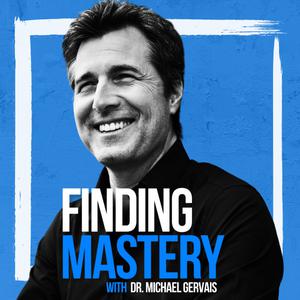 Finding Mastery with Dr. Michael Gervais
Finding Mastery with Dr. Michael Gervais
 The Talent Equation Podcast
The Talent Equation Podcast
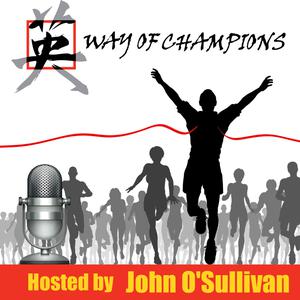 Way of Champions Podcast
Way of Champions Podcast
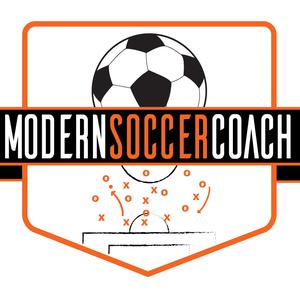 Modern Soccer Coach Podcast
Modern Soccer Coach Podcast
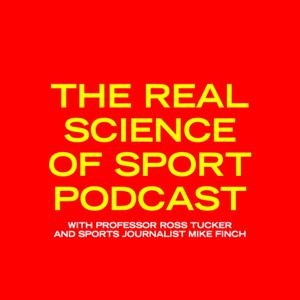 The Real Science of Sport Podcast
The Real Science of Sport Podcast
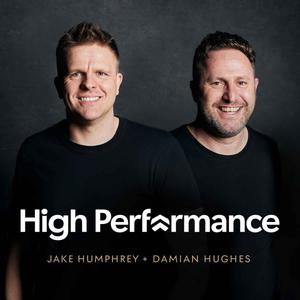 The High Performance Podcast
The High Performance Podcast